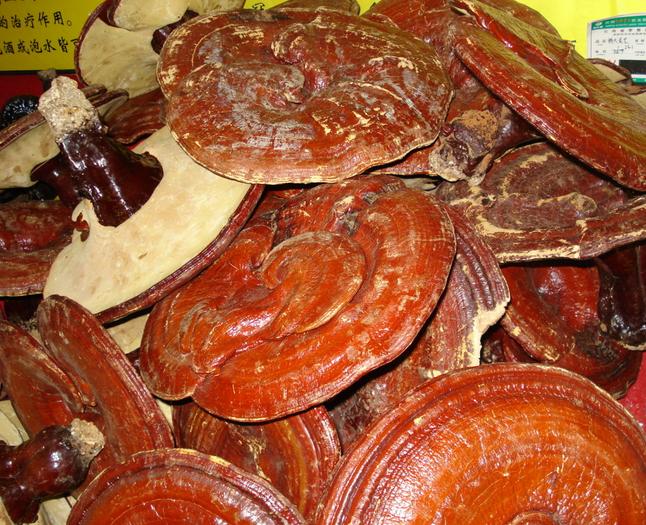Ganoderma lucidum Complete perfect Ling zhi
Common name:Lingzhi mushroom
Lingzhi is a polypore mushroom that is soft (when fresh), corky, and flat, with a conspicuous red-varnished, kidney-shaped cap and, depending on specimen age, white to dull brown pores underneath.It lacks gills on its underside and releases its spores through fine pores, leading to its morphological classification as a polypore
Current usage
Lingzhi can be found for sale in many Asian markets as well as Western health shops. Extracts of ‘lingzhi,’ which may also be called ‘reishi’ are also available. In general, a hot water extract is best at concentrating the polysaccharides in lingzhi and alcohol extracts are best at concentrating the triterpenoids in lingzhi but an extract can also be made with a blend of both extracts
Medicinal uses
Lingzhi may possess some anti-tumor, immunomodulatory and immunotherapeutic activities, supported by some studies on polysaccharides, terpenes, and other bioactive compounds isolated from fruiting bodies and mycelia of this fungus (reviewed by R. R. Paterson). However, the efficacy of these compounds in the treatment of cancer has not yet been shown in clinical trials. Moreover, as with any herb, variation between preparations and potential negative side effects cannot be ruled out. It is understood as adaptogenic, anti-allergenic and anti-hypertensive due to the presence of triterpenes. Apart from these properties, lingzhi has been found to be anti-inflammatory, antiviral, anti-parasitic, anti-fungal, antidiabetic, anti-hypotensive, and protective of the liver. It has also been found to inhibit platelet aggregation, and to lower blood pressure, cholesterol and blood sugar.
Because of these properties, lingzhi has been regarded as blood pressure stabilizer, antioxidant, analgesic, a kidney and nerve tonic. It has been used in bronchitis prevention and in cardiovascular treatment, and in the treatment of high triglycerides, high blood pressure, hepatitis, allergies, chemotherapy support, HIV support, and even for fatigue and altitude sickness.
Some peer-reviewed studies indicate that ganoderic acid has some protective effects against liver injury by viruses and other toxic agents in mice, suggesting a potential benefit of this compound in the treatment of liver diseases in humans.
Although the experiences in fighting cancer are more inconsistent, the extract has been claimed to be effective in regressing tumors. The results depend on the type of cancer and the severity of the condition. It is usually recommended that it be used in combination with other prescribed medical treatments and as part of a fu zheng formula with a variety of supporting herbs. The Ganoderma extract has been employed to help substantially reduce or eliminate the side-effects of radio- and chemotherapies if it is taken before, during and after the treatments. It has been found clinically to reduce side-effects like hair loss, nausea, vomiting, stomatitis, sore throat, loss of appetite and insomnia.

.jpeg)
.jpeg)
.jpeg)
